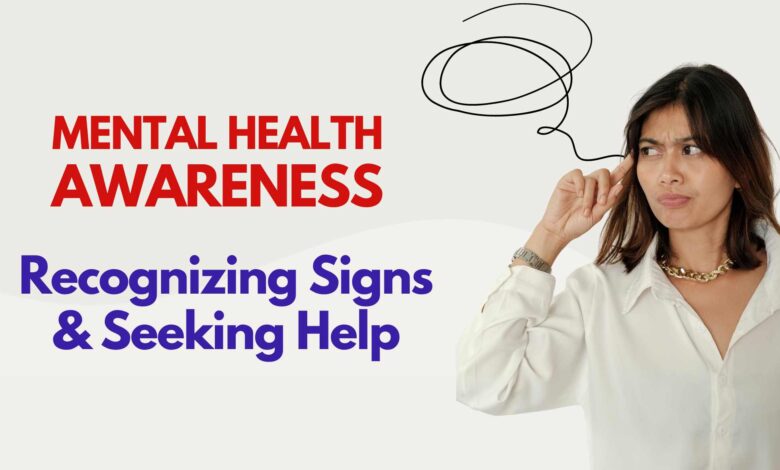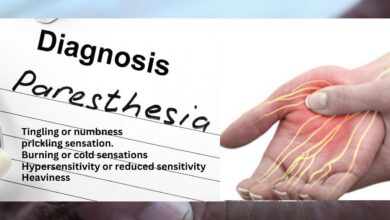
Mental health often overshadows physical health issues, but it plays an important role in our overall well-being. It encompasses our emotional, psychological and social state and influences how we think, feel and behave.
Just like you prioritize your physical health by making medical appointments and maintaining a healthy lifestyle, prioritizing your mental health requires being conscious, self-care, and taking care of your needs. It is necessary to seek professional help.
Stigma associated with mental illness has long been a barrier to help-seeking. Mental illness, often associated with weakness or lack of character, is actually just as legitimate and treatable as physical illness. Anxiety, depression, bipolar disorder, and post-traumatic stress disorder (PTSD) are just a few examples of the many mental illnesses that can affect people of all ages, backgrounds, and walks of life.
Table of Contents
Recognize the signs:
The first step in dealing with mental issues is recognizing the signs. Symptoms vary depending on the specific condition, but common signs include:
- Mood swings: Persistent sadness, anxiety, and irritability are important signs.
- Changes in sleep patterns: Difficulty falling asleep, waking up too often, or sleeping too much can interfere with daily life.
- Changes in appetite: Significant weight loss or gain due to changes in eating habits can be a red flag.
- Loss of interest in activities you once enjoyed: A lack of interest in activities you once enjoyed may indicate a more serious problem.
- Difficulty concentrating and making decisions: Mental confusion, forgetfulness, and indecision can affect your work and relationships.
- Withdrawing from social interactions: Avoiding social situations or feeling isolated can have a negative impact on your mental health.
- Physical symptoms: Headaches, abdominal pain, and fatigue may be related to underlying psychological problems.
- Thoughts of self-harm or suicide: Never ignore thoughts of suicide. Seek immediate help from a crisis hotline or a psychologist.
The importance of early intervention:
Mental illnesses, like physical illnesses, are often more manageable if treated early. Ignoring the signs can make symptoms worse and affect your daily life, relationships, and work performance. Early intervention allows implementation of an effective treatment plan and may reduce the severity and duration of symptoms.
Looking for help:
If you recognize signs of a potential mental health problem in yourself or a loved one, it is very important to seek help. There are a variety of resources available to help you overcome the fear and stigma associated with mental health care.
- Talk to trusted friends and family: Sharing your concerns can provide support and encouragement.
- Visit your primary care physician to discuss your symptoms and concerns. They will perform an initial assessment and refer you to a psychologist if necessary.
- Consult a mental health professional: Psychologists, psychiatrists, and therapists are all trained to diagnose and treat mental health conditions.
- Take advantage of online resources: Many mental health websites and apps offer information, support groups, and even online therapy options.
- Contact a crisis hotline: If you or someone you know is experiencing a mental health crisis, a hotline can provide immediate support and connect you with resources.
Breaking the stigma:
Mental health awareness campaigns play an important role in reducing the stigma surrounding mental illness. By talking openly about mental health and sharing personal experiences, we can create a more supportive environment where people feel safe asking for help.
Social media platforms can be powerful tools for raising awareness, sharing resources, and fostering a sense of community. Promoting mental health:
While seeking help is important to manage mental health issues, a variety of strategies can promote mental health and prevent problems from occurring.
- Develop healthy coping mechanisms: Exercise, relaxation techniques (such as meditation and deep breathing), and journaling can help you manage stress and improve emotional regulation.
- Maintain a healthy lifestyle: Eating a balanced diet, getting enough sleep, and limiting alcohol and drug use are crucial for overall health, including mental health.
- Build strong social connections: A strong support system of friends and family provides a sense of belonging and connection, which is crucial for mental health.
- Practice self-care: Make time to have fun, relax, and set boundaries to maintain your mental health. Seek professional help regularly: Even if you don’t have a specific psychological problem, preventive therapy and regular check-ups with a psychologist may be beneficial.
Also Read: The Role of Hormones in Weight Management 2025
Conclusion
Mental health awareness is not just a trend. It’s a call to action. By recognizing the signs, seeking help when needed, and encouraging healthy coping mechanisms, we can create a world where mental health is prioritized and treated with the same importance as physical health.
Let’s break down the stigma, empower ourselves and our loved ones to prioritize their mental health, and work together to build a more mentally healthy future for all.




